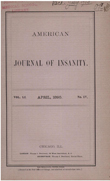Self-regard: a new measure
Abstract
OBJECTIVE: The status of patients and research subjects is usually considered in terms of self-reported symptoms. Measures seldom include disturbances in a conscious sense of the self. An additional brief measure of the sense of current self-regard is desirable, since a conscious lapse in an integrated self-concept may occur under stressful circumstances. The authors constructed and tested such a measure. METHOD: Clinical interviews had indicated five common experiences that occurred more frequently as complaints during stress-induced regressions in the sense of the self as a functioning mind-body agency. An anchored five-item scale, the Self-Regard Questionnaire, was constructed and tested with 79 subjects who were in the midst of grief from the death of a spouse. Data analyses included checks on the internal coherence of questionnaire scale scores and their association with symptom, personality, and social desirability measures. RESULTS: The five-item Self-Regard Questionnaire was completed quickly, in less than a minute, and led to internally consistent and unique data. Low levels of overall self-regard were correlated with higher levels of distress and predicted prolonged distress. CONCLUSIONS: These results suggest that the questionnaire is a useful, quick, and easy-to-score self-report tool for assessing, and reassessing over time, current experiences of the self. The five questions may also be useful to clinicians who evaluate patients in contexts other than research.
Access content
To read the fulltext, please use one of the options below to sign in or purchase access.- Personal login
- Institutional Login
- Sign in via OpenAthens
- Register for access
-
Please login/register if you wish to pair your device and check access availability.
Not a subscriber?
PsychiatryOnline subscription options offer access to the DSM-5 library, books, journals, CME, and patient resources. This all-in-one virtual library provides psychiatrists and mental health professionals with key resources for diagnosis, treatment, research, and professional development.
Need more help? PsychiatryOnline Customer Service may be reached by emailing [email protected] or by calling 800-368-5777 (in the U.S.) or 703-907-7322 (outside the U.S.).



